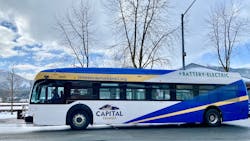Capital Transit unveils first all-electric zero-emission bus
Capital Transit launched its first battery-electric bus for passenger service April 14, with this being the first electric bus owned and operated by a public transit agency in Alaska.
“The City and Borough of Juneau [CBJ] is committed to bringing clean, safe and reliable public transportation to its ridership and the community,” Public Works and Engineering Director Katie Koester said. “Capital Transit drivers and mechanics have been retraining to operate and maintain the new 40-foot bus and to learn the nuances of its integrated battery management system. We have eliminated oil changes.”
Capital Transit unveiled the bus, manufactured in California by Proterra, during an event April 8. Juneau Mayor Beth Weldon hosted the dedication ceremony of the first battery-electric bus to join Capital Transit’s fleet. Guests included Alaska Gov. Mike Dunleavy, State Senator Jesse Kiehl (D-District Q), Alaska Department of Transportation and Public Facilities (DOT&PF) Commissioner John MacKinnon and Proterra representative Mark Hollenbeck.
The new bus will be servicing the Mendenhall Express route, which travels via Glacier Highway between the Downtown Transit Center and the Mendenhall Mall, the location of Capital Transit’s future transfer site.
Original funding for the electric bus came from the U.S. Department of Transportation Federal Transit Administration through the Low- or No-Emission (Low-No) Grant Program. The program provides funding for state and local governmental authorities to purchase or lease zero-emission and low-emission transit buses. Funding was passed through DOT&PF and a matching grant was provided by the Alaska Energy Authority under the Volkswagen Settlement fund. Capital Transit already uses three electric cars as support vehicles, purchased through grant funding from DOT&PF.
The CBJ Assembly has set a goal of 80 percent renewable energy by 2045. The bus is another step toward that goal and, with the help of many supporters, Capital Transit has been successful in being awarded Low-No grants for four consecutive years. CBJ plans to use those funds to replace seven 2010 diesel buses that are at the end of their useful life.
